For Berlusconi, the Tipping Point?
“This is the tipping point,” our friend, a dynamic management consultant of 35, exulted. “It’s an avalanche,” the delighted head of the Partito Democratico (PD), Pierluigi Bersani proclaimed. The reason for their glee: in mid-term election run-off’s held May 29 and 30 in 55 scattered Italian cities and townships, Premier Silvio Berlusconi’s Popolo della Libertà (PdL) took an unexpectedly robust shellacking. In the two big cities where stakes were highest, Milan in the North and Naples in the South, leftist outsiders Giuliano Pisapia, a lawyer, and former magistrate Luigi de Magistris won hands down.
The financial capital of Italy has been a conservative stronghold for the past 18 years, and Berlusconi warned voters that if the left won, the city would become “Zingaropolis” (Gypsyville), a warren for other undesirables like transvestites and immigrants. Despite this vulgar and racist rhetoric, , Pisapia won 55% of the vote and handily surpassed the current mayor of Milan supported by the PdL, Letizia Moratti, who claimed less than 45%. Serene and smiling, she offered her help to her successor and said she was available to work with “all moderates.”
And in Naples, De Magistris copped almost two-thirds of the votes cast (over 65%), versus Gianni Lettieri’s frankly feeble showing (under 35%). In a low turnout, Lettieri actually dropped some 39,000 votes from the first round. Naples this evening was festive, flags waving and people in the piazzas excitedly shouting.
Elections for posts in provincial governments and in smaller cities like Cagliari in Sardinia and Trieste on the Northern border similarly showed a shift leftward. Novara in Piedmont, one of the strongholds of the Northern League, overturned its center-right administration in favor of center-left candidate Andrea Ballaré. Even in tiny Arcore, the outlying Milanese township that is Berlusconi’s home town, and where he has built his pharaonic tomb in the garden of his villa, the center-right was ousted in favor of a leftist candidate who happens to be a woman, Rosangela Colombo. The town council will be 50% female, and one city councilman is black, moreover.
Berlusconi himself is out of Italy on a state visit to Romania, where at a press conference he pointedly spoke only of foreign affairs. Already, Berlusconi had taken preventive action, blaming Moratti for being a “weak candidate” and saying—in contradiction with his words of just a month ago—that he saw no reason to reason to resign in case she lost Milan. Back home in Rome, however, Sandro Bondi, Berlusconi’s former Culture Minister and currently one of the three lieutenants who run the PdL, resigned on hearing the election results. His resignation is being seen here as the opening move in a crisis of confidence within the party which Berlusconi himself founded less than three years ago.
As for the Northern League, its spokesmen are openly blaming the Berlusconi party for tarnishing the League image by using inappropriate language, including the attacks on magistrates, just as Berlusconi blamed Moratti for the predicted loss of Milan. (No one is yet mentioning Naples.)
But besides being an avalanche, is this also the tipping point? Is the obviously over-stressed and agitated Berlusconi washed up, and will the government implode? For the moment that is less clear than are the voters’ preferences. “Don’t expect the government to collapse in any great rush,” was the admonishment made by an editorial writer for the authoritative Turin daily La Stampa. His reasoning: the victors were not from the big established parties like the PD, but from parties representing the protest vote, including the small but influential Beppe Grillo’s organization. This protest element will make it difficult to forge an alternative government to Berlusconi’s, with summer vacation looming as an excuse for biding time. Even Bersani, while crowing with delight in a Monday afternoon press conference, was cautious about where and when.
But never mind: what matters, in the minds of many in the center-left and even in the center-right, is that the voters did not appear brainwashed by the Premier’s innumerable TV appearances and the plainly slanted news as presented on some of the state TV programs and, of course, on the trio of channels owned outright by Berlusconi. “This is not a dictatorship of the media,” one observer said proudly. “On the contrary, I’m so proud that people voted with their own brains.”
The next step in election terms: the referendum to take place in just two weeks in which voters are asked to pronounce for or against three issues: nuclear power, privatization of water and the kinky question called “legitimate impediment,” which translates into giving top political leaders [read: Berlusconi] an elongated legal leash allowing them to dodge prosecution.






























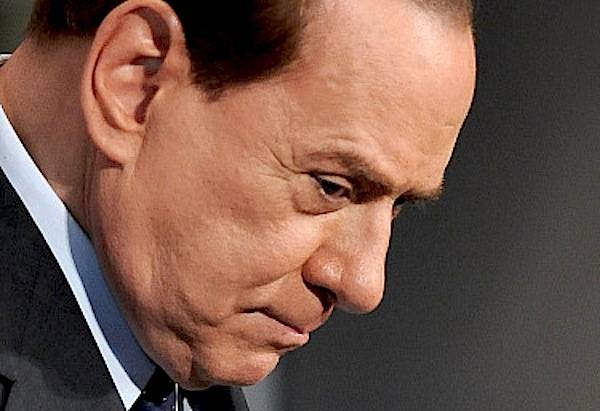
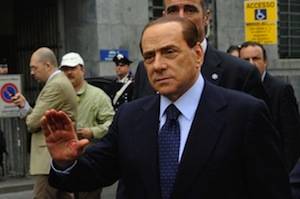
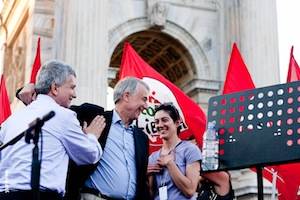
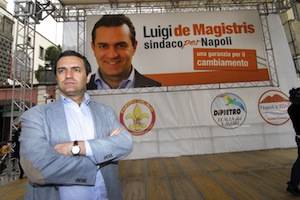
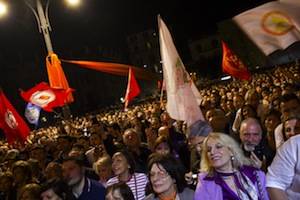



i-Italy
Facebook
Google+
This work may not be reproduced, in whole or in part, without prior written permission.
Questo lavoro non può essere riprodotto, in tutto o in parte, senza permesso scritto.